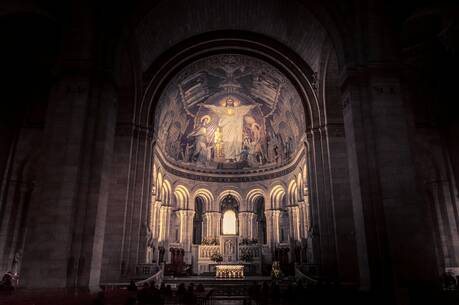Today’s Gospel: The Glory of Life
Everyone’s life seems more glamorous on social media, basically a curated series of magical moments and constant achievements, but much more of our time is spent attending to the things of daily life, like making coffee, changing diapers, cleaning out the garage, commuting to work, writing out the minutes for a church committee, shoveling snow, taking the car in for repairs or tidying the house. Not much of it seems glorious.
Our daily lives are not simply drudgery. There are also moments of joy, laughter and insight, as well as pain and loss. But it is by attending to the small steps that the whole journey comes into focus. The mass of seemingly insignificant daily tasks we perform creates the bedrock of our spiritual lives, the vantage point from which we can see the glory to come.
When God established the covenant relationship with Abram, comprising the promises of descendants as numerous as the stars and a land to possess, God also set before Abram a time frame of hundreds of years in which the people of Israel would be enslaved, away from their promised land, and then wandering in the desert. This journey was not simply a time of inattentive waiting or abject yearning, but precisely the time when their spiritual path could be established through faithfulness to God and attention to the Torah.
Daily life itself is the proving ground of the spiritual life, in whatever form it takes and wherever it takes place. And by God’s command, Abram himself responded to God’s covenant, which would not be fully realized in his own lifetime, with the fruit of his labor and life, offering his animals in sacrifice. There is no pristine spiritual path here on earth, just the constant faithful living of our lives in the realms of the sacred and the mundane as we prepare for our heavenly home.
There can be temptations both to turn away from the slog of daily life and focus only on the world to come, or to reject the world to come and focus only on daily life. The apostle Paul in the Letter to the Philippians warns against those who are “enemies of the cross of Christ,” whose “god is the belly; and their glory is in their shame; their minds are set on earthly things.” Paul instead centers the Philippians on our “citizenship” (politeuma) “in heaven.”
The Greek word refers to more than simply individual citizenship but to the body of those who make up a political entity—that is, a commonwealth or state of believers. Heaven is our homeland, and it is there, Paul says, that Christ “will transform the body of our humiliation that it may be conformed to the body of his glory.” Glory is our destiny, the end of the spiritual path, but it is in and through the journey that we arrive home.
This is why Paul, when considering his possible death earlier in Philippians, debates what would be better: to remain here on earth or to be with Christ. Paul says that “dying is gain” and remaining “in the flesh” is “fruitful labor” and that he does not know what he prefers (Phil 1:21–22). But Paul concludes that he has work here on earth that must be completed, and so he is convinced he will remain with the Philippians. We all have work to finish here on earth and we do not know the time of its completion, which is why it is important for us to be faithful and attentive to each of our tasks at all times, however dull they appear.
The glory awaits us, as Peter, John and James experienced during the transfiguration of Jesus. It is the glorious reality at the heart of our divine call and our divine future. The path to this future, however, passes through the vicissitudes of life, whether boring, exciting or suffused with suffering, as Jesus knew. For in the transfiguration, Moses and Elijah were talking to Jesus about “his departure, which he was about to accomplish at Jerusalem.” The glory passes through the paschal mystery, Jesus’ departure paving the way for our journey home.
This article also appeared in print, under the headline “The Glory of Life,” in the February 15, 2016, issue.








